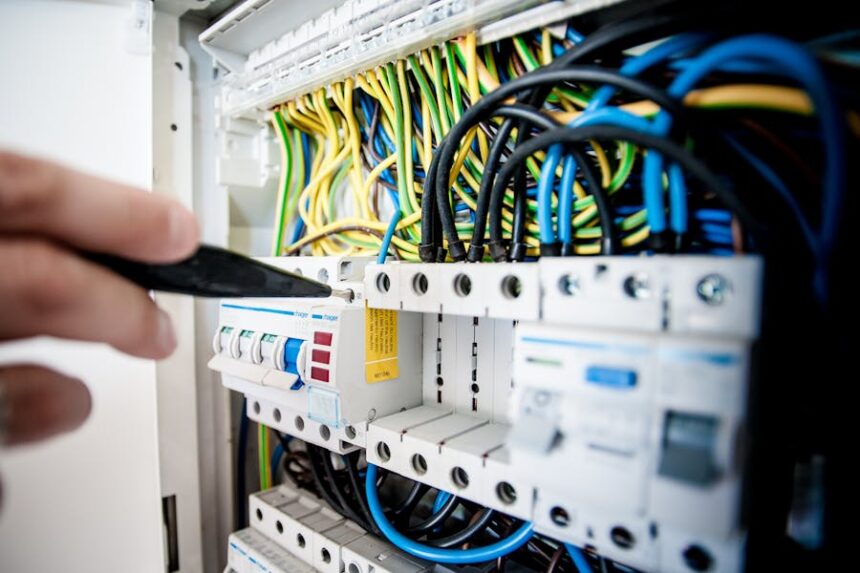In the modern world, electricity powers nearly every aspect of daily life. From the lights in our homes to the appliances you use, and even the devices that keep people connected, electricity is indispensable.
At the heart of this system are electricians, skilled professionals who design, install, maintain, and repair electrical systems that make our lives easier and safer. Understanding the role of electricians sheds light on their vital contributions to both residential and commercial sectors.
What Do Electricians Do?
Installing, maintaining, and troubleshooting electrical systems are the responsibilities of electricians. Their duties can vary widely depending on the industry they work in, but their core tasks typically include:
- Installation of Electrical Systems
Electricians design and install electrical systems in buildings, ensuring that power is distributed efficiently and safely. This includes wiring, circuit breakers, outlets, and lighting systems. Whether it’s a new home or a large commercial facility, electricians ensure the infrastructure supports the building’s power needs. - Maintenance and Repairs
Electrical systems can wear out over time or fail due to unforeseen issues. Electricians are tasked with inspecting, diagnosing, and repairing problems, from faulty wiring to malfunctioning equipment. Regular maintenance prevents dangerous issues like electrical fires or power outages. - Adherence to Safety Codes
Electricians must comply with local and national electrical codes to ensure the systems they work on are safe and reliable. This attention to detail helps prevent accidents, injuries, and property damage caused by electrical malfunctions. - Specialized Services
Some electricians specialize in specific areas such as industrial systems, renewable energy installations like solar panels, or smart home technologies. These specialized roles require advanced training and certifications.
Why Are Electricians Essential?
Electricians play a critical role in the functioning of modern society, ensuring that homes, businesses, and public infrastructure operate smoothly. Here are a few reasons why their work is indispensable:
1. Safety First
Electricity is powerful and, if mishandled, can be extremely dangerous. Faulty wiring or poorly maintained electrical systems can lead to fires, electrocution, or even fatalities. Electricians ensure that systems are safe to use, reducing the risk of accidents.
2. Keeping the Lights On
From powering your kitchen appliances to enabling complex industrial machinery, an electrician in Melbourne keeps the systems people rely on running efficiently. Their expertise minimizes downtime and ensures consistent power supply.
3. Supporting Technological Advancements
With the rise of smart homes, electric vehicles, and renewable energy solutions, electricians are at the forefront of integrating these innovations into everyday life. Their knowledge bridges the gap between traditional electrical systems and modern technology.
4. Environmental Impact
Electricians contribute to a greener future by installing and maintaining energy-efficient systems. This includes LED lighting, energy management systems, and renewable energy solutions like solar panels. Their work reduces energy consumption and lowers carbon footprints.
Training and Skills of an Electrician
Electricians undergo extensive training to master their trade. Their career path typically includes:
- Formal Education: Many electricians start with technical training programs that provide foundational knowledge of electrical systems, safety protocols, and tools.
- Apprenticeships: Practical, hands-on experience is critical in this field. Apprenticeships allow aspiring electricians to learn from experienced professionals while working on real projects.
- Licensing and Certification: Electricians must pass rigorous licensing exams to ensure they meet safety and competency standards. Many specialize further with additional certifications in areas like renewable energy or industrial systems.
Beyond formal training, electricians require key skills such as problem-solving, attention to detail, manual dexterity, and the ability to work under pressure.
Electricians in Residential vs. Commercial Settings
Electricians work across various environments, each presenting unique challenges and opportunities:
- Residential Electricians
These electricians focus on homes, handling tasks like wiring new houses, installing lighting, or upgrading outdated electrical systems. They are also called upon for troubleshooting and repairing issues such as flickering lights or tripped breakers. - Commercial Electricians
Working in office buildings, retail spaces, or factories, commercial electricians manage larger-scale systems that often involve higher voltage. They design and maintain electrical setups to handle the complex power needs of businesses.
When to Call an Electrician
Knowing when to call an electrician can save you time, money, and potential hazards. These are typical circumstances where expert assistance is crucial:
- Frequent Power Outages: If your home or business experiences repeated power failures, an electrician can diagnose the root cause.
- Electrical Upgrades: Planning to add new appliances, upgrade your panel, or incorporate smart home technology? An electrician ensures your system can handle the added load.
- Flickering Lights: This can indicate faulty wiring or a circuit overload, both of which require professional attention.
- Burning Smell or Sparks: These are serious warning signs of an electrical fire risk and should never be ignored.
The Future of Electrical Work
As technology continues to evolve, so too does the role of electricians. The rise of renewable energy, electric vehicles, and automation systems is reshaping the field, creating demand for professionals who can integrate these technologies. Electricians are at the forefront of building energy-efficient and sustainable systems that will power the future.
Hire Electricians
Electricians are the backbone of your electrified world, ensuring that homes, businesses, and industries operate safely and efficiently. Their skills extend far beyond wiring and repairs—they are essential in supporting technological advancements, promoting sustainability, and enhancing safety.
Whether you’re planning an upgrade, tackling a repair, or building something new, electricians provide the expertise needed to power your modern lives. Their role is not just about electricity; it’s about enabling progress, comfort, and innovation.




